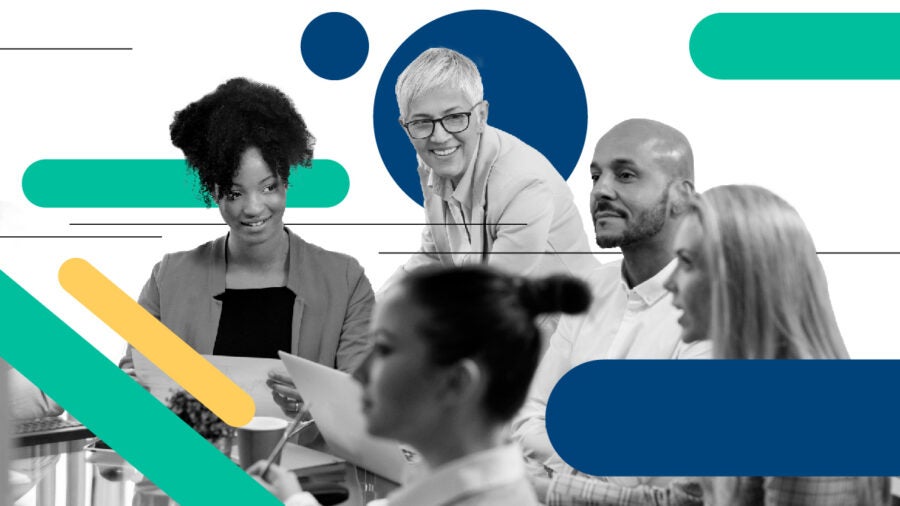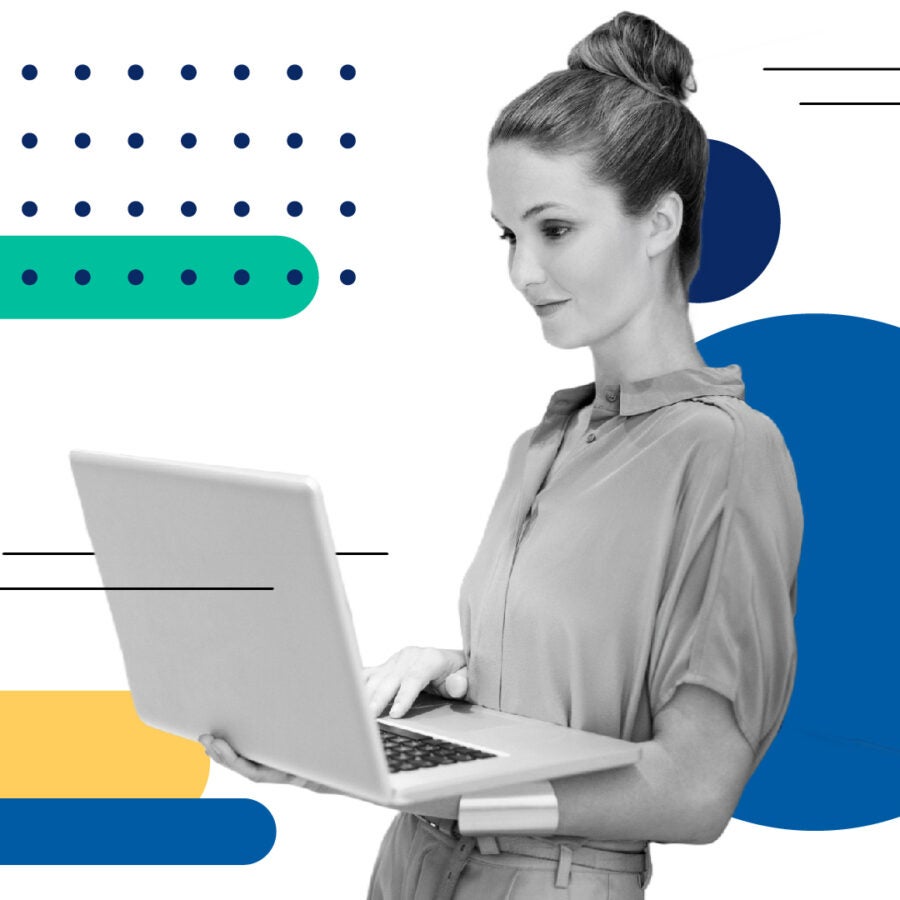
Internet access has become an essential utility in the modern world. Yet despite its vast influence over people’s lives, the average person likely has a limited understanding of the mechanisms of the online world.
Society has leapt from an age of information scarcity to information overload in just a couple of decades and, as a result, digital literacy has not kept in step with the evolution of technology.
Video journalist Nicole Scott has been digging into the inner workings of the internet and the impact this has on digital freedom in a bid to close this knowledge gap. Her four-part Digital Democracy YouTube investigative series aims to bring awareness of the need for greater digital literacy and a more democratic and responsible approach to the internet. The series has been supported by Ionos, who recognise the need for users to be empowered with the knowledge and tools needed for informed decision-making about the future of the online world.
That goal is shared by Scott. “It’s going to be important in the future to discuss digital democracy and the fact that our internet has borders,” she says. “What does this mean for the everyday person? How are we going to trust in the future? Anyone keeping up with the news and the state of the media can tell that our digital freedoms are in danger.”
She notes that trust in the digital landscape is becoming more uncertain with the rise of AI. It is becoming harder for the average person to fact check and understand what is real and what isn’t online.
“The internet is no longer just a communication system,” adds Scott. “It’s also a control network in which all of these things are connected, and in which battles over control of the infrastructure serve as a proxy for political power.”
So, who pulls the strings in the online world? What is its governance? And how do website ownership and domain validation affect digital freedoms?
How is content managed and controlled?
While the end user receives bits and bytes through wireless signals, the internet is underpinned by vast bits of physical infrastructure. And that’s different depending on where a user is located and how advanced the technology is. “Infrastructure impacts the way the internet feels and looks to users tremendously,” says Markus Noga, chief technology officer at Ionos.

The control network is exerted over physical infrastructure with more force in some places than in others. Campaigners struggle to keep the internet free, open and decentralised in the face of forces trying to control and censor online content. And the battle is often fought over that physical infrastructure, such as the Domain Name System, or DNS. It’s the library of the internet that directs what you type into an internet protocol, or IP, address.
“In the context of internet freedom, DNS plays a critical role,” says Neal McPherson, head of product management domains at Ionos. “It’s a centralised system. There are only a few entities that control the root servers of the DNS.”
But those with access to the root servers can bend the internet to their will. The DNS can be used for censorship and content blocking by governments and companies. “Imagine that librarian has the power to choose which books you’re allowed to read, and what you’re not allowed to read at all,” says Scott. “They might hide certain books for you, or only allow you to read specific ones.”
While DNS blocking is used by some governments to restrict access to malicious content such as images of child abuse, adopting the position that DNS blocking by default is a good measure runs the risk of compartmentalising the internet. If a country decides a business’s website isn’t suitable, then that business could be cut off from millions of customers.
One of the most extreme examples of this is China’s Great Firewall system of pervasive internet censorship. China isn’t alone in this, with Russia and Iran also seeking to grasp control of their countries’ DNS, which could enable them to censor or change the books in that digital library. Who holds control holds power.
What does good governance look like?
In the face of increased attempts to control the internet, good internet governance is more important than ever. “The internet is a decentralised network, so there is nobody who controls the internet per se,” explains Scott. But that doesn’t mean there’s no oversight. “Of course, we have organisations that help and coordinate things,” she says. Key organisations such as the Internet Engineering Task Force (IETF) and the Internet Corporation for Assigned Names and Numbers (ICANN) set standards and policies for the internet’s infrastructure.
ICANN is the organisation that is perhaps the most well-known because it often interfaces with countries and their representatives about good custodians of the internet. “We manage what are known as the identifiers that are in the background of the internet – think about things like IP addresses or domain names,” says John Crain, senior vice president and chief technology officer at ICANN. The organisation also develops internet policy in collaboration with its community. “Our community is made up of pretty much anybody who has an interest in the policies governing the domain name space and the generic domain name space,” says Crain.
Monopolies don’t serve consumer interests or protect rights well
Such a multi-stakeholder approach engenders trust and ensures no one participant can overpower the others. Sometimes that deliberate design is tested to its limit. Recently, Ukraine approached ICANN and asked it to remove Russia’s domains from the internet as a form of sanction for its invasion of their country. ICANN took the temperature of its community. “They discussed it openly,” says Scott. “And they said no.”
But alongside broad, community-led initiatives, private companies are exerting their power. And that’s the inherent tension within the internet: built on open-source principles but layered with proprietary, sometimes monopolistic systems. The latter is something many are trying to avoid. “Monopolies don’t serve consumer interests or protect rights well,” says Prem Trivedi, policy director at the Open Technology Institute at New America. “When companies acquire more power, and they don’t need to compete with other companies for customers’ business, then the customer loses leverage. That’s why the open-source movement matters.”
Keeping the open-source voice in the current and future development of the internet is a principle that’s key to organisations such as the Open Technology Institute, and those such as Ionos, who wholeheartedly support open-source initiatives as the bedrock of the digital world.
Everything in moderation
It’s not just between private enterprise and open source adherents that this tussle is being fought. “Governance of the internet is one of the most powerful arenas for conflict right now,” says Scott. “All of war is now being mediated by cyber technologies.”
But conflict, and conflicted opinions, are also evident in the most basic ways people interact online. Decisions about what to do about cyberbullying, nationalistic tendencies and hate speech are now in the hands of private companies. Those decisions used to be made by the public or by governments. And they affect millions of people – and businesses that operate online.
Different countries take varying approaches to content governance, with the United States having “a much higher threshold for determining what speech the government can actually take action against,” says Trivedi, compared to Europe due to “cultural distinction, even among democracies.” That results in a two-track internet. It presents a challenge for businesses that cross borders as they have to decide which rules to follow at a minimum level.
Likewise, businesses may have to battle for space in search results against false or competing claims from competitors. “One of the biggest challenges that Google and the other search engines face is presenting accurate information,” says Lily Ray, senior director of SEO and head of organic research at Amsive Digital.
That’s compounded by the AI revolution, which is putting often experimental AI-generated results into what used to be seen as a largely fact-based system. “It kind of gets you into this territory of, ‘Should the AI be answering in these cases?’” says Ray. Knowing how the results are generated, and how AI works, will be an important part of future digital literacy.
Restoring trust and understanding truth
With countries and companies fighting for control of internet infrastructure, misfiring moderation, and AI search results replacing fact with fiction, getting to the truth and restoring trust as the internet evolves is easier said than done.

“I’ve learned that we don’t want an unrestricted internet, but an open one that allows for diverse expression, fair access and creativity,” says Scott. “Though our vision on how exactly this comes together might differ, we can all agree that trust is key. The internet’s exponential growth has had unintended consequences for openness and transparency online.”
Some argue that new technologies, such as Web3 and blockchain, are the answer to restoring trust in the internet’s development. But before businesses plough cash into innovations, they need to know how widespread adoption is likely to be – and that’s far from certain.
What is certain is that unity and consistency across the internet are important. “We don’t want our internet to get fragmented into different technologies, different things that only work in silos,” says Dhruv Dhody, internet architecture board member at IETF. “The idea of having a single internet, a single routing system, a single DNS is very, very important.”
To be able to speak up, individuals, and especially those in leadership positions at organisations, need to be literate about how the internet works and know what changes to call for. “The power to drive change lies within each of us,” says Scott. “We must change our relationship to the internet and become active citizens. Progress requires participation. Together, we can ensure the internet remains a force for good, empowering us all.”
Lessons for businesses
Empowering individuals isn’t enough to tackle the challenges of our changing digital world. What should businesses be aware of?
Don’t put all your eggs in one basket
The private enterprises that control parts of the internet infrastructure can quickly change policies – with enormous impacts on everyone. Tech giants frequently and unexpectedly increase license fees to the detriment of smaller customers rather than large enterprises.
Support open source endeavours
The internet and the web have long run on the backs of volunteers who offer their time, services and products on an open-source basis. Open code enables better continuity – crucial for core components of the digital world.
Deploy a multi-cloud strategy
Not only do you avoid the risks outlined above, but you benefit from the flexibility of different providers to optimise performance, speed and costs to your business.
Watch the Digital Democracy documentary series, presented by Nicole Scott, and produced with the support of Ionos, on YouTube now

Internet access has become an essential utility in the modern world. Yet despite its vast influence over people’s lives, the average person likely has a limited understanding of the mechanisms of the online world.
Society has leapt from an age of information scarcity to information overload in just a couple of decades and, as a result, digital literacy has not kept in step with the evolution of technology.
Video journalist Nicole Scott has been digging into the inner workings of the internet and the impact this has on digital freedom in a bid to close this knowledge gap. Her four-part Digital Democracy YouTube investigative series aims to bring awareness of the need for greater digital literacy and a more democratic and responsible approach to the internet. The series has been supported by Ionos, who recognise the need for users to be empowered with the knowledge and tools needed for informed decision-making about the future of the online world.

